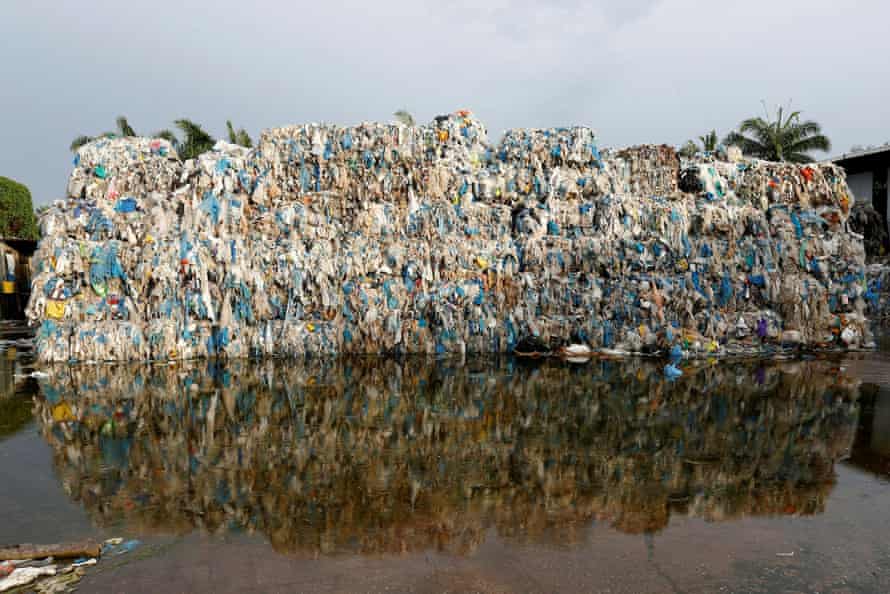The UK has been accused of failing to honour its promise to curb shipments of plastic waste to developing countries, after it emerged Britain’s new post-Brexit regulations are less stringent than those imposed by the EU.
From 1 January, shipments of unsorted plastic waste from the EU to non-OECD countries were banned.
But Britain will continue to allow plastic waste to be exported to developing countries, despite a Tory party manifesto commitment to banning the practice, and promises of no regression of environmental standards post-Brexit.
UK exports will now be made under a new system of “prior informed consent”, under which the importer has to agree to accept the waste, and has the opportunity to refuse it.
Britain is one of the biggest producers of plastic waste in the world, second only to the US. It exports about two-thirds of its plastic waste.
The EU ban and the UK’s new regulations were prompted by international rules, under the Basel convention, to tackle the global trade in plastics, which has seen wealthy nations dump contaminated plastic waste on poorer ones. The regulations came into force this month.
Jim Puckett, director of the Basel Action Network, said it was known as early as April 2019 that the EU planned to ban exports of dirty and unsorted plastic waste.
“We had assumed the UK would at least follow the EU, and so it is a shock to find out now that instead they choose to have a far weaker control procedure, which can still permit exports of contaminated and difficult-to-recycle plastics to developing countries,” said Puckett.
“They are talking the talk, but they have failed to walk the walk.”
Puckett said about 90% of plastic waste exports come under the category of dirty and unsorted plastic waste, subject to the Basel rules. “This is the guts of the amendment. This is the stuff we see being dumped and burned in south-east Asia.”
The UK shipped 7,133 metric tonnes of waste to non-OECD countries, including Malaysia, Pakistan, Vietnam, Indonesia and Turkey in September 2020 alone, according to HMRC data analysed by the organisation the Last Beach Clean Up.

Yuyun Ismawati, an activist with Indonesian environmental group Nexus3 Foundation, said: “It is disturbing to see that the UK wishes to continue its waste management malpractice using developing countries as dumping grounds. In Indonesia, we have documented large amounts of imported UK plastic waste dumped and burned in farming communities by substandard recyclers who can only actually recycle a small percentage of the waste.”
Indonesia was one of seven countries to request containers of UK plastic waste be sent back last year.
Luke Pollard, the shadow secretary of state for the environment, food and rural affairs, said it was time the government delivered on its pledges. “The government has made big promises to match environmental standards from Europe and to ban plastic waste exports. There can be no dither or delay.
“The British people expect to see these exports banned, more recycling of materials at home and faster action on the climate crisis. It is up to ministers to deliver on their promises and fast, but this does not look good.”
Waste that cannot be recycled usually ends up being illegally burned or dumped in landfills or waterways, where it finds its way into the ocean.
Last month, the UN transboundary waste chief told the Guardian he hoped to see a reduction in ocean plastic within five years after the introduction of the new international rules.
Tim Grabiel, environmental lawyer at the Environmental Investigation Agency, said: “We would have liked to see the UK show leadership and align with the EU in going the extra step and banning plastics to non-OECD countries. If 27 states of the EU can do it, then the UK certainly can. We hope in time the UK will reconsider its position.”
While the UK’s introduction of prior informed consent for plastic waste exports will increase transparency in the notoriously lawless transboundary trade, the system is open to abuse, environmentalists say.
Sam Chetan-Welsh, a Greenpeace political campaigner, said: “Our government promised to maintain or exceed EU environmental standards after Brexit, but creating a loophole to allow the dumping of our plastic trash on environments and communities bodes very badly. This is not leadership, it’s failing to do the bare minimum.”
A spokesperson for the Department for Environment, Food and Rural Affairs, said the government had “pledged to ban the export of all plastic waste to non-OECD countries”, but did not give a timetable for action. The department said it had commissioned research to better understand existing UK plastic waste recycling capacity and would consult in due course on how to deliver its manifesto commitments.